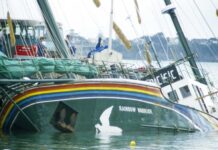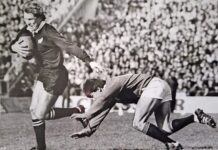In the mid-1980s Rob and Jennie Fenwick came across a remote headland forming the western flank of Te Matuku Bay, on the island’s south-east coast. They bought a small property at Little Bay, accessible only by boat, and put a caravan on it.
Then came an opportunity to buy the whole peninsula between Te Matuku and Awaawaroa bays. The land had been farmed for more than 100 years but had seen better days, Rob told the Waiheke Weekender a couple of years ago.
“It was locked in a time warp. The fencing was dilapidated, the gorse was in full flight, there was stock everywhere: black Angus cattle destroying the bush, marauding around.”
They decided the best approach was to help the land to regenerate into native forest, using the gorse as a nursery. The couple were already prominent in environmental circles (Rob was a founder of the Living Earth composting business).
They later sold the Awaawaroa side of the peninsula but retained property on the Te Matuku side and set to work planting thousands of natives – and waging war on rats, cats and stoats.
That effort has more than paid off, with native birds thriving in the lush bush. In 2002, 360 hectares of regenerating bush was covenanted under the Reserves Act, enshrining the area’s undeveloped nature.
But the Fenwick’s efforts were not confined to the land. After a long campaign, a marine reserve was created in 2005 at Te Matuku bay and beyond its headlands as far as Passage Rock and the western tip of Ponui Island. And within the reserve is a commercial oyster farm – which they have resurrected from its former derelict state using sustainable principles. More recently they gifted a 3km walking track through their land, linking Awaawaroa with Te Matuku.
The amazing story of the Fenwicks at Te Matuku Farm will be showcased on TVNZ’s Country Calendar on Sunday night.
Of course, Rob’s conservation endeavours stretch well beyond the farm. He’s been involved in saving kiwi on the mainland and these days chairs Kiwis for Kiwi and the Predator Free New Zealand Trust. His passion for Antarctica has seen a peninsula named after him. He was knighted in 2016.
He understands the Country Calendar item will traverse much of what the couple and their three daughters have created at Te Matuku. “The programme makers are interested in stories about businesses working more and more in sympathy with ecosystems and exhibiting environmental responsibility,” Rob says.
“With Te Matuku Oyster Farm, it was at the forefront of our minds from the beginning that it would be as sustainable as it could be in terms of its impact on the marine environment.” • Geoff Cumming







